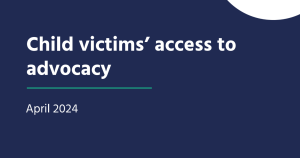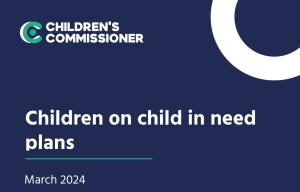As the Children’s Commissioner for England, my statutory duty, as set out in the Children Act 2004, is to promote and protect the rights of all children, with particular regard to children who are living away from home or receiving social care services.
In 2014, under section 2D of Act, the Commissioner’s powers were extended to providing advice, assistance, and representation to this group of children, and to care leavers up to the age of 25. This role is fulfilled by my Help at Hand service. It is an integral part of my office and I am proud of the work they do every day to ensure that the rights of vulnerable children and young people are upheld, and their voices heard.
In 2022 the office conducted a review of Help at Hand to consider how the team could reach more children and provide an even better service. Over the past 12 months, the team has been implementing the recommendations of that review, and this report outlines the progress made so far.
It is important to me that the team not only helps the individual children who need it most, but also ensures that their experiences are used to inform the office’s research and policy work at a national level. Case examples from Help at Hand have enriched my office’s forthcoming report on homeless 16 and 17 year olds, our briefings during the passage of the Illegal Migration Act, and our recent Disabled children’s vision for change, in addition to my ongoing work on the SEND and Alternative Provision Improvement Plan and addressing school attendance, particularly for looked after children who are out of school.
Following the recommendations of the 2022 review, Help at Hand entered a data sharing agreement with Ofsted, which means the team now receives details of any children’s homes that have a provisional rating of inadequate. The team then tries to ensure that all of the children affected are offered advocacy by their local authority. Between April and June 2023, of the 656 children’s homes inspected by Ofsted, 84 (13%) had a final inspection judgement of inadequate.
This illustrates the quantity of work the Help at Hand team have taken on and also indicates the scale of change needed to ensure there is the right quality and range of residential provision for children. It is also another reason for ensuring that all children in care have the opportunity to share concerns about their accommodation and other aspects of their lives. This is why I believe so strongly in promoting advocacy and the role Help at Hand can play in this. My forthcoming Advocacy Audit will set out the nationwide state of advocacy for children and young people, including examples of children referred to Help at Hand.
My team had 998 referrals in the period from September 2022 to August 2023. Often, thanks to their intervention, the issues were resolved, and potential breaches of children’s rights were addressed. In some instances, I intervened myself, when the issues appeared intractable or the team had not received an adequate response from the key professionals.
On 28 occasions over the course of the year, I personally wrote to decision makers, for example, Directors of Children’s Services, about children where I had real concerns that their rights were being breached. In many cases, this related to looked after children who were being denied their right to education, often after being moved out of their home area. Many of these children have special educational needs met through Education, Health, and Care Plans (EHCPs), so responsibility for their education is shared between their corporate parent authority and the area where they are living, which manages the EHCP and school admission.
Too often I see poor communication between local authorities and confusion about responsibilities and funding, with an unacceptable impact on these children’s education. I have also written to local authority and NHS England directors about children with complex needs and trauma who are unable to leave hospital because there is no suitable therapeutic community placement available for them. I am equally concerned about a further group of children living in community placements of various types while subject to deprivation of liberty (DOL) orders.
The Help at Hand team can provide assistance to these children if they or their advocates reach out and, although the DOL conditions are subject to court scrutiny, on a number of occasions I have questioned the suitability of the accommodation and arrangements in place for these children. Help at Hand is currently supporting the cross-government Task and Finish project to understand children’s experiences of being deprived of their liberty, and how the system can be changed to work better for them.
An awareness of the lived experiences of our most vulnerable children is crucial to helping me understand the problems they are facing and gives so much more force to my conversations with decision-makers at local and national level about what needs to change for them.
This year’s Help at Hand annual report outlines key themes that have emerged from the team’s work, with examples of where they have been able to make a difference. It also sets out the team’s plans going forward, including the ongoing work to implement the findings of the 2022 review and ensure they are reaching as many children as possible and making the maximum impact.
I will do all I can to support the team with this and look forward to seeing what they can achieve over the next year.





